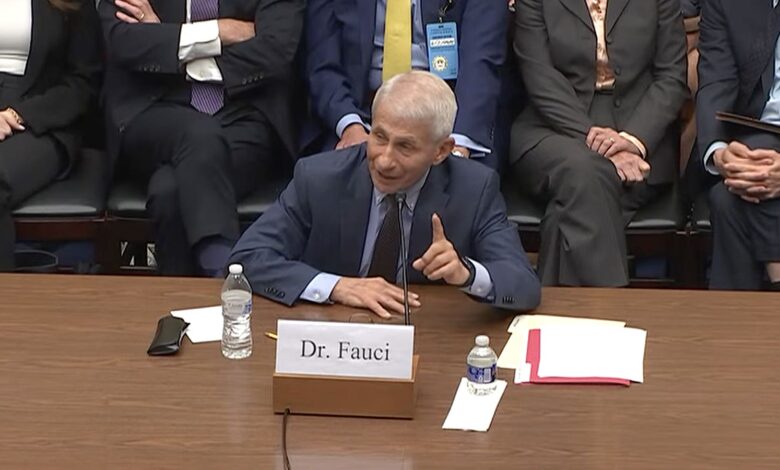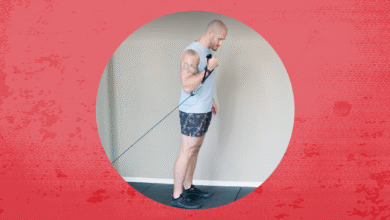Fauci Denies ‘False Accusation’ of COVID Origins Cover-Up

—
Republicans question his interactions with scientists who may have acted improperly
by
Shannon Firth,
Washington Correspondent, MedPage Today
June 3, 2024
House Republicans grilled Anthony Fauci, MD, former chief medical adviser to President Biden, during a contentious House hearing on Monday, but Fauci was adamant that accusations about his involvement in a cover-up of COVID-19’s origins were false.
With regard to the “false accusation that I tried to cover up the possibility that the virus originated from a lab — in fact, the truth is exactly the opposite,” Fauci said. In his written testimony, he shared a Feb. 1, 2020 email sent to scientist Jeremy Farrar, MD, former director of the Wellcome Trust, in which Fauci discussed concerns raised by Kristian Andersen over certain mutations of the coronavirus, stating that another scientist “should get a group of evolutionary biologists together to carefully examine the data to determine if his concerns are validated,” and, if so, “report it to the appropriate authorities.”
“It is inconceivable that anyone who reads this email could conclude that I was trying to cover up the possibility of a lab leak,” Fauci said at the hearing, which marked his first public appearance since his retirement.
Focus on Pandemic Origins
The House Oversight and Accountability Select Subcommittee on the Coronavirus Pandemic has held a number of hearings focused on the pandemic’s origins, many of them around a “lab leak” theory — the idea that the virus was created in a Chinese lab. The subcommittee has also held hearings related to shutdown measures, vaccine mandates, and side effects of the vaccine.
Subcommittee Chair Rep. Brad Wenstrup, DPM (R-Ohio), began the hearing with a reminder of the House rules of decorum. He thanked Fauci, the former head of the National Institute of Allergy and Infectious Diseases (NIAID), for his years of service but did not hold back criticism, implying that Fauci took an authoritarian approach to keeping the public in line with the government’s policy recommendations.
“Dr. Fauci, you once said, ‘If you disagree with me, you disagree with science,'” Wenstrup said. “Science doesn’t belong to any one person,” he argued, but must be borne out through hypotheses that are proven or disproven. He claimed Fauci “chose not to pursue an aggressive and transparent scientific investigation of both natural spillover and lab leak,” hypotheses of COVID’s origin.
Wenstrup claimed the former NIAID director “embraced” a “proximal origin letter” published in March 2020 which stated that the SARS-CoV-2 virus was “not a laboratory construct” — a view Fauci shared publicly from the White House lawn. Wenstrup also raised concerns over behaviors of other NIAID officials.
“We have senior officials from your office, in their own writing, discussing breaking federal law, deleting official records, and sharing private government information with grant recipients,” Wenstrup said. In May, the subcommittee made public a trove of private emails that seem to indicate some agency officials deleted messages or used private email to try to circumvent public record laws, according to The Hill.
Fauci Disputes Morens’s Testimony
David Morens, MD, a senior advisor to the NIAID director, testified last month that he may have emailed information related to government business to Fauci’s personal email, prompting Wenstrup to call for Fauci’s own private emails and cell phone records related to the Wuhan Institute of Virology, NIAID grantee EcoHealth Alliance, and the origins of the coronavirus. Morens also spoke of “a secret back channel” that he could use to convey information to Fauci.
Fauci disputed Morens’s remarks. “Let me state for the record, that to the best of my knowledge, I have never conducted official business using my personal email,” he said. As for the alleged “secret back channel,” Fauci said, “I don’t have any idea what he’s talking about.” Fauci also denied deleting any emails or records related to the Wuhan Institute of Virology or the origins of the coronavirus. Fauci characterized Morens’s behavior as “an aberrancy and an outlier” and not indicative of the larger department.
In Wenstrup’s opening remarks, he said that under Fauci’s leadership “disgraced characters” like Peter Daszak, PhD, president of EcoHealth Alliance, were allowed to spend millions in taxpayer dollars conducting “risky gain-of-function experiments … You did sign off on his research grant,” the subcommittee chair said.
EcoHealth Alliance collaborated with the Wuhan Institute of Virology to study bat coronaviruses. At an earlier hearing with the same subcommittee, Subcommittee Ranking member Raul Ruiz, MD (D-Calif.), argued that Daszak, a virology researcher, had attempted to “deliberately mislead” regulators and that EcoHealth failed to comply with reporting requirements for federal grantees.
When asked specifically about signing off on Daszak’s grant, Fauci said that NIAID funded thousands of grants and that it would be “physically impossible” to review each grant in detail. Asked by another lawmaker whether it was appropriate for Morens to provide Daszak with advice “regarding how to mislead NIH on EcoHealth’s late progress report,” Fauci said that was “wrong and inappropriate and violated policy.”
Ruiz asked Fauci to explain how he knows there is no connection between research conducted in Wuhan, China, with NIH grants and the “progenitor virus” of SARS-CoV-2. “When you’re talking about the evolution of a virus from one to another, the viruses that were studied under the sub-awards to the Wuhan Institute [of Virology] that have been reported in … reports in the literature and published papers, those viruses were phylogenetically so far removed from SARS-COV-2 that it is molecularly impossible for those viruses to have evolved, or been made into SARS-CoV-2. It’s just a virological fact,” Fauci said.
Vehement Defense by Democrats
Democrats vehemently defended Fauci, lauding his service and his work, and apologizing for the personal attacks he endured in and outside of the hearing.
Ruiz argued that Republicans were using the investigation into the origins of COVID-19 to “weaponize” a lab leak theory, “to fuel sentiment against our nation’s scientists and public health officials,” and “to deflect blame and anguish” from former President Trump, whose “stumbling pandemic response” led to an estimated 400,000 unnecessary deaths, Ruiz said.
The subcommittee has conducted over 100 hours of closed-door interviews with current and former government officials and scientists — including Fauci — and pored over more than 425,000 pages of documents provided by the government, organizations, and private citizens, Ruiz said, adding that the subcommittee has found nothing to suggest that Fauci funded research through the EcoHealth Alliance grant that sparked the COVID-19 pandemic. Nor did the committee find that Fauci lied about gain-of-function research in Wuhan, he added.
Subcommittee members also found nothing to suggest he “orchestrate[d] a campaign to suppress the lab leak theory … After 15 months, the Select Subcommittee still does not possess a shred of evidence to substantiate these extreme allegations that Republicans have levied against Dr. Fauci for nearly 4 years,” Ruiz said.
Rep. Jamie Raskin (D-Md.) similarly argued that all that the subcommittee’s investigation revealed is that Fauci is “an honorable public servant … He is not a comic book super-villain,” and he urged the majority to pursue “an authentic investigation” into the pandemic’s origins.
-
![author['full_name']](https://clf1.medpagetoday.com/media/images/author/shannonFirth_188.jpg)
Shannon Firth has been reporting on health policy as MedPage Today’s Washington correspondent since 2014. She is also a member of the site’s Enterprise & Investigative Reporting team. Follow



